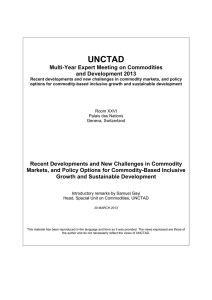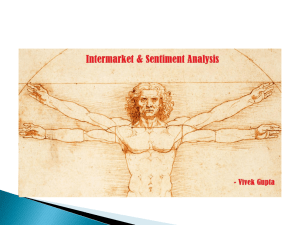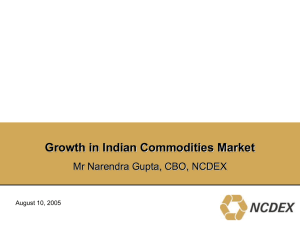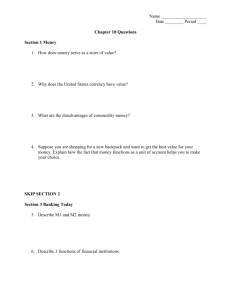TD United Nations Conference
advertisement
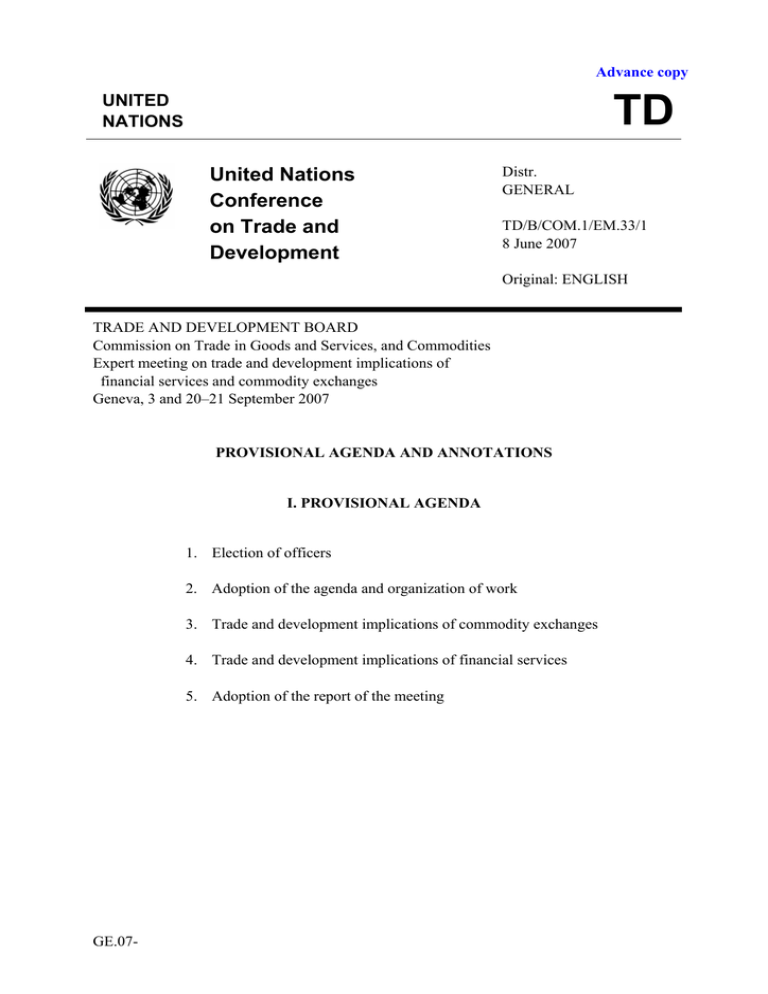
Advance copy TD UNITED NATIONS United Nations Conference on Trade and Development Distr. GENERAL TD/B/COM.1/EM.33/1 8 June 2007 Original: ENGLISH TRADE AND DEVELOPMENT BOARD Commission on Trade in Goods and Services, and Commodities Expert meeting on trade and development implications of financial services and commodity exchanges Geneva, 3 and 20–21 September 2007 PROVISIONAL AGENDA AND ANNOTATIONS I. PROVISIONAL AGENDA 1. Election of officers 2. Adoption of the agenda and organization of work 3. Trade and development implications of commodity exchanges 4. Trade and development implications of financial services 5. Adoption of the report of the meeting GE.07- TD/B/COM.1/EM.33/1 page 2 II. ANNOTATIONS TO THE PROVISIONAL AGENDA Item 1. Election of officers 1. It is recommended that the expert meeting elect a Chairperson and a ViceChairperson-cum-Rapporteur. Item 2. Adoption of the agenda and organization of work 2. The provisional agenda for the expert meeting is reproduced in section I above. The expert meeting will have three days to complete its work: on 3 September (first part) and 20– 21 September 2007 (second part). The provisional schedule of meetings for the three days is attached to this document. Detailed programmes will be available at the latest one week before the part of the meeting concerned. Documentation TD/B/COM.1/EM.33/1 Provisional agenda and annotations Item 3. Trade and development implications of commodity exchanges 3. The part of the meeting covering the trade and development implications of commodity exchanges will take place on 3 September 2007. The São Paulo Consensus, in paragraph 100, states that: “UNCTAD should continue to monitor developments in commodity markets and assist developing countries, in particular those most dependent on commodities, in formulating strategies and policies to respond to the challenges of commodity markets, including … addressing links between international commodity trade and national development, particularly poverty reduction. It should analyse and promote exchange of information on commodity markets … including through assistance for institution building; analyse and support the development of appropriate and effective mechanisms and capacity to respond to commodity price fluctuations and to mitigate earnings shortfalls, in particular by improving the capacity to apply modern commodity price risk management and financial instruments.” Accordingly, the expert meeting will consider issues relating to the development and application of commodity exchanges as institutions for facilitating trade and offering instruments to manage price risk in developing countries’ commodity sectors. 4. Structural changes in underlying commodity markets – in particular, liberalization and the substantial withdrawal of government support for the sector – initially drove the promotion by emerging-market Governments of exchanges as an instrument of commoditysector development. In recent years, a more ambitious approach has been taken. Largely driven by advances in information and communications technology, commodity exchanges are now moving beyond earlier constraints to become institutional catalysts for improving performance in the commodity sector and for integrating supply chains. 5. The discussions on this topic will serve to inform UNCTAD member States about the growing usefulness of commodity exchanges in liberalizing and globalizing commodity markets. The discussions will provide a forum for appraising the extent to which a commodity exchange can trigger a wide range of potential benefits for developing countries’ TD/B/COM.1/EM.33/1 page 3 commodity sectors by: creating markets and broadening access to them; building confidence among commodity-sector participants to enter into trading relationships; improving the price discovery process; facilitating risk management and access to finance; enhancing infrastructure; and upgrading the quality of production. Experts will also examine the key challenges in promoting a robust but facilitative regulatory environment within which a commodity exchange can operate effectively, as well as the role of commodity exchanges in stimulating the expansion of South–South commodity trade and regional integration. 6. To facilitate the discussion, the UNCTAD secretariat has prepared a background note entitled “The development role of commodity exchanges”. Documentation TD/B/COM.1/EM.33/2 “The development role of commodity exchanges” Item 4. Trade and development implications of financial services 7. The part of the meeting covering the trade and development implications of financial services will take place on 20 and 21 September, pursuant to the mandate contained in the São Paulo Consensus. It will aim to provide UNCTAD member States with a better understanding of the important role that financial services play in efforts aimed at economic growth, domestic supply capacity building, trade and, more broadly, sustainable development in developing countries. More specifically, it will aim at helping developing countries to improve and reform their domestic policies, regulatory frameworks and institutions, to harness financial services for the benefit of inclusive development and to make informed choices about the liberalization of financial services at the national, regional and international levels. 8. Financial services are both key infrastructure and commercial services and have close linkages with macroeconomic factors. Within an effective regulatory and policy framework, financial services can contribute to economic development (e.g. by improving an economy’s productivity, including by facilitating transactions and mobilizing savings). Frequently, however, developing countries’ financial services sectors are characterized by shallow markets and government intervention. 9. The liberalization of trade in financial services can contribute to a country’s financial services sector, but can also pose important risks and challenges to the stability of the financial system, particularly in light of global and technological developments in the global financial services trade. If the liberalization of financial services is to generate prodevelopment outcomes, it needs to be supported by appropriate and effective regulatory (including prudential and supervisory) policies, frameworks and institutions. For developing countries, implementing such regulatory frameworks and building effective institutions in the financial services sector remains a challenge. 10. The meeting will explore key financial services subsectors, their trade and development implications and their role in achieving financial stability within the context of a country’s broader development objectives. The meeting will analyse international market trends in financial services; the increasing integration and globalization of financial services markets; the role of financial services in economic development and the impact of financial globalization, reform and liberalization on developing countries’ markets; and the implications of privatization, consolidation and the increased role of foreign banks in TD/B/COM.1/EM.33/1 page 4 developing countries and transition economies (including in emerging economies). Participants will also discuss the costs of financial instability and possible lessons learned from financial crises, including the role of international standard-setting and the attendant challenges for developing countries. In so doing, the meeting will give participants the chance to share experiences and best practices related to the supply of efficient financial services, possible niche areas with export potential that developing countries could build on, ways to enhance access to financial services, the effectiveness of the existing domestic supply of financial services and the development of proper regulatory frameworks. Finally, the expert meeting will look at the role played by the current negotiations on the liberalization of trade in services in the context of financial integration, and what role Governments play in ensuring the viability and stability of the financial system and the provision of universally accessible financial services. 11. Presentations by experts, representatives of the private and public sectors, policymakers, regulators and trade negotiators will contribute to a better understanding of the options available to developing countries in the pursuit of their trade and development objectives in the financial services sector. The meeting will also draw on the outcome of the ad hoc expert meeting on insurance services, held in November 2005. TD/B/COM.1/EM.33/3 Documentation “Trade and development implications of financial services” Item 5. Adoption of the report of the meeting 12. The report of the two parts of the expert meeting will be submitted to the Commission on Trade in Goods and Services, and Commodities, at its next session. The expert meeting may wish to authorize the Rapporteur, under the authority of the Chairperson, to prepare the final report after the conclusion of the meeting. Input from experts: trade and development implications of commodity exchanges Experts nominated by member States are encouraged to submit brief papers (approximately five pages) as contributions to the work of the meeting. The papers should be submitted to the UNCTAD secretariat in advance of the meeting and will be made available at the meeting in the form and language in which they are received. Papers, which should draw on the expert’s experience, may address one or more of the following issues: • What have been the drivers of growth in recent years for commodity exchanges in developing countries? • In which situations is a commodity exchange an appropriate instrument of policy? • How do commodity exchanges fit into the wider policy framework? • What scope exists for commodity exchanges to make a significant development impact on commodity sectors in the developing world? • What have been the experiences of commodity exchanges in different developing geographical areas? TD/B/COM.1/EM.33/1 page 5 • What have been the major challenges and obstacles faced by developing countries’ commodity exchanges? • What forms of regulation are appropriate for commodity exchanges in developing countries? • How can the proper balance between regulatory benefits and costs, and between regulatory and self-regulatory structures, be determined in developing countries? • What is the proper role of, and regulatory framework for, speculative interest in commodity futures markets? • How can commodity exchanges facilitate regional integration and South–South trade? • Where do the greatest opportunities lie for the development of regional exchanges? • What are the policy-related and other challenges to the realization of potential gains? Experts are requested to submit papers by 3 August 2007 to: Ms. Leonela Santana-Boado or Mr. Adam Gross, Commodities Branch, Division on Trade in Goods and Services, and Commodities, Palais des Nations, CH-1211 Geneva 10, Switzerland; fax: +41 22 917 0509; e-mail: leonela.santanaboado@unctad.org or adam.gross@unctad.org. Input from experts: trade and development implications of financial services Experts nominated by member States are encouraged to submit brief papers (approximately five pages) as contributions to the work of the meeting. The papers should be submitted to the UNCTAD secretariat in advance of the meeting and will be made available at the meeting in the form and language in which they are received. Papers, which should draw on the expert’s experience, may address one or more of the following issues: • What are the international market trends in financial services, including the opportunities and challenges posed by newer financial products and services? How does the increasing integration and globalization of financial services manifest itself in particular financial services subsectors and particular countries? • What are key policies for strengthening the supply of efficient financial services and ensuring universal access? • What are the linkages between financial services liberalization, financial stability and countries’ broader development objectives? What lessons have been drawn from financial crises? • Has financial services liberalization led to an increase in international trade, growth and development? What are the implications of privatization, consolidation and the increased role of foreign banks? • Do countries at different levels of development have different experiences in the development of the financial services sector as well as with the kind of financial services and products that are used? How can these markets be integrated into global financial markets? • What is best practice in the development of prudential and other regulatory and institutional frameworks? • What is the role of international standard-setting in the regulation of financial services markets? Can developing countries benefit from this trend towards international standard-setting and what are the likely costs of implementing standards? • What are the particular challenges facing developing countries with regard to the proliferation of international standards? What could be done to facilitate developing countries’ participation in international standard-setting bodies? TD/B/COM.1/EM.33/1 page 6 • What is the approach taken in regional initiatives to the regulation and liberalization of financial services? Are the lessons learned in respect of cooperative mechanisms taken into account? • What is the role of the current negotiations in the World Trade Organization on the liberalization of trade in services with regard to financial integration and the possible attendant development benefits? Experts are requested to submit papers by 20 August 2007 to: Ms. Mina Mashayekhi or Ms. Elisabeth Tuerk, Trade Negotiations and Commercial Diplomacy Branch, Division on Trade in Goods and Services, and Commodities, Palais des Nations, CH-1211 Geneva 10, Switzerland; fax: +41 22 917 0044; e-mail: mina.mashayekhi@unctad.org or elisabeth.tuerk@unctad.org. TD/B/COM.1/EM.33/1 page 7 PROVISIONAL SCHEDULE OF THE MEETING MONDAY 3 September 2007 THURSDAY 20 September 2007 FRIDAY 21 September 2007 (10 a.m. – 1 p.m.) (10 a.m. – 1 p.m.) (10 a.m. – 1 p.m.) Plenary Opening statement Item 1: Election of officers Item 2: Adoption of the agenda and organization of work Item 3: Trade and development implications of commodity exchanges Informals Item 4: Trade and development implications of financial services Informals Item 4: (continued) (3 p.m. – 6 p.m.) (3 p.m. – 6 p.m.) (3 p.m. – 6 p.m.) Informals Item 3: (continued) Informals Item 4: (continued) Informals Consideration of the outcome of the meeting Plenary (closing) Item 4: Adoption of the report of the meeting ********

